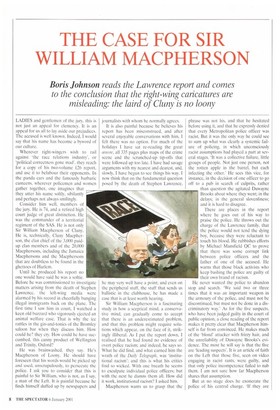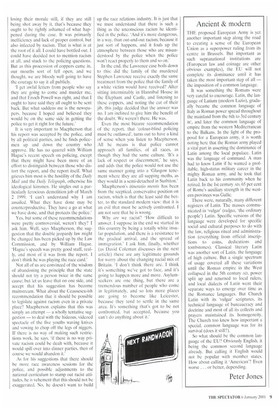THE CASE FOR SIR WILLIAM MACPHERSON
Boris Johnson reads the Lawrence report and comes
to the conclusion that the right-wing caricatures are misleading: the laird of Cluny is no loony
LADIES and gentlemen of the jury, this is not just an appeal for clemency. It is an appeal for us all to lay aside our prejudices. The accused is well known. Indeed, I would say that his name has become a byword of our culture.
Wherever right-wingers wish to rail against 'the race relations industry', or 'political correctness gone mad', they reach for a copy of his two-volume £26 report, and use it to belabour their opponents. In the panda cars and the famously barbaric canteens, wherever policemen and women gather together, one imagines that they utter his name softly, sibilantly and perhaps not always smilingly.
Consider him well, members of the jury. He is 74, and a retired high court judge of great distinction. He was the commander of a territorial regiment of the SAS. He is not only Sir William Macpherson of Cluny. He is, technically, Cluny Macpherson, the clan chief of the 3,000 paidup clan members and of the 20,000 Macphersons, including the Jamaica Macphersons and the Macphersons that are doubtless to be found in the ghettoes of Harlem.
Until he produced his report no one would have said he was a softie. Before he was commissioned to investigate matters arising from the death of Stephen Lawrence, the left-wing media were alarmed by his record in cheerfully bunging illegal immigrants back on the plane. The first time I saw him in court. I watched a keen old buzzard who vigorously ejected an animal welfare case. That is why the ice rattles in the gin-and-tonics of the Bromley saloon bar when they discuss him. How could he? they cry. How could he have succumbed, this canny product of Wellington and Trinity, Oxford?
He was brainwashed, they say. He's Macpherson of Loony. He should have foreseen that his words would be picked up and used, unscrupulously, to persecute the police. I ask you to consider that this is painful to Sir William, who is not, as I say, a man of the Left. It is painful because he finds himself duffed up by newspapers and journalists with whom he normally agrees.
It is also painful because he believes his report has been misconstrued, and after several enjoyable conversations with him, I felt there was no option. For much of the holidays I have sat re-reading the great ceuvre, all 335 pages plus maps of the crime scene and the scrunched-up tip-offs that were followed up too late. I have had savage arguments with my nearest and dearest, and, slowly, I have begun to see things his way. I now think that on the fundamental question posed by the death of Stephen Lawrence,
he may very well have a point; and even on the peripheral stuff, the stuff that sends us ballistic in the clubhouse, he has made a case that is at least worth hearing.
Sir William Macpherson is a fascinating study in how a sceptical mind, a conservative mind, can gradually come to accept that there is an underestimated problem, and that this problem might require solutions which appear, on the face of it, strikingly illiberal. As I put the report down, I realised that he had found no evidence of overt police racism; and indeed, he says so. What he did find, and what earned him the wrath of the Daily Telegraph, was 'institutional racism'; and this is what his critics find so wicked. With one breath he seems to exculpate individual police officers; hut with the next he damns them all. How did it work, institutional racism? I asked him.
Macpherson wants us to grasp that the phrase was not his, and that he hesitated before using it, and that he expressly denied that every Metropolitan police officer was racist. But it was the only way he could see to sum up what was clearly a systemic failure of policing, in which unconsciously racist assumptions had played a part at several stages. 'It was a collective failure, little groups of people. Not just one person, not the rotten apple in the barrel, but each infecting the other.' He sees this vice, for instance, in the decision of one officer to go off to a pub in search of culprits, rather than question the agitated Duwayne Brooks about where they went; in the delays; in the general slovenliness; and it is hard to disagree.
There are places in the report where he goes out of his way to praise the police. He throws out the charge of the Lawrence family, that the police would not tend the dying boy, because they were reluctant to touch his blood. He rubbishes efforts by Michael Mansfield QC to prove that there was some corrupt link between police officers and the father of one of the accused. He warns that those black activists who keep bashing the police are guilty of their own brand of racism.
He never wanted the police to abandon stop and search. 'We said two or three times that it was an important weapon in the armoury of the police, and must not be discontinued, but must not be done in a discriminatory way.' As for the five suspects, who have been judged guilty in the court of public opinion, a close reading of the report makes it pretty clear that Macpherson himself is far from convinced. He makes much of the 'blond' attacker with frizzy hair, and the unreliability of Duwayne Brooks's evidence. The most he will say is that the five are 'leading suspects'. It is an article of faith on the Left that those five, seen on video engaging in racist rants, were guilty, and that only police incompetence failed to nab them. I am not sure how far Macpherson shares that assumption.
But at no stage does he exonerate the police of his central charge. 'If they are losing their morale still, if they are still being shot away by it, that's because they ought to he rightly ashamed of what happened during the case. It was primarily inefficiency and lack of proper control, hut also infected by racism. That is what is at the root of it all. I could have bottled out. I could have decided not to mention racism at all, and stuck to the policing questions. But as this procession of coppers came in, our mouths sort of fell open, and we thought, we are bloody well going to have the courage to say it all publicly.
1 get awful letters from people who say they are going to come and murder me, and that Enoch Powell was right, and that I ought to have said they all ought to be sent back. But what saddens me is the newspapers, because I hoped and believed they would be on the same side in getting the police to get it right for the future.'
It is very important to Macpherson that his report was accepted by the police, and by all political parties, and he finds policemen up and down the country who approve. He has no quarrel with William Hague's recent speech on policing, except that there might have been more of an effort to distinguish between those who distort the report, and the report itself. What grieves him most is the hostility of the Daily Mail and the Daily Telegraph, otherwise his ideological kinsmen. He singles out a particularly ferocious demolition job of March 2 1999. 1 can't understand why I am assailed. What they have done may be counterproductive. They have a go at what we have done, and that protects the police.'
Yes, but some of these recommendations were pretty controversial, weren't they? I ask him. Well, says Macpherson, the suggestion that the double jeopardy law might be changed has been picked up by the Law Commission, and by William Hague. 'Hague's speech was pretty good stuff, really, and most of it was from the report. I don't think he was playing the race card.'
Not all of us are convinced of the wisdom of abandoning the principle that the state should not try a person twice in the same cause; but !et us leave that on one side, and accept that his suggestion has become mainstream. What about the Ceausescu-ish recommendation that it should be possible to legislate against racism even in a private place? Macpherson explains that this was simply an attempt — a wholly tentative suggestion — to deal with the hideous, videoed spectacle of the five youths waving knives and vowing to chop off the legs of niggers. If there is no way of making such restrictions work, he says, 'if there is no way private racism could be dealt with, because it would spill over into dinner parties, then of course we would abandon it.'
As for his suggestions that there should be more race awareness sessions for the police, and possible adjustments to the national curriculum to stamp out racist attitudes, he is vehement that this should not be exaggerated. No, he doesn't want to build up the race relations industry. It is just that we must understand that there is such a thing as the unconscious racism he identified in the police. 'And it's more dangerous, in a way, than out-and-out racism, because it just sort of happens, and it fouls up the atmosphere between those who are misunderstood by the police when the police won't react properly to them and so on.'
In the end, the Lawrence case boils down to this: did the family of the murdered Stephen Lawrence receive exactly the same treatment from the police that the family of a white victim would have received? After sitting interminably in Hannibal House in the Elephant and Castle, and listening to these coppers, and noting the cut of their jib, this judge decided that the answer was no. I am inclined to give him the benefit of the doubt. We weren't there. He was.
Even the most bizarre recommendation of the report, that 'colour-blind policing must be outlawed', turns out to have a kind of sense when you listen to Macpherson. All he means is that police cannot approach all families, of all races, as though they had the same culture. `It's a lack of respect or discernment,' he says, and adds that the police would not use the same manner going into a 'Glasgow tenement where they are all supping meths, as they would in a semi-detached in Surbiton.'
Macpherson's itineratio mentis has been from the sceptical, conservative position on racism, which is that the least said the better, to the standard modern view: that it is an evil that must be actively confronted. I am not sure that he is wrong.
Why are we racist? 'How difficult to answer. I suppose in the end we started in this country by being a totally white insular population, and there is a resistance to the gradual arrival, and the spread of immigration.' I ask him, finally, whether (as David Coleman discusses in the next article) there are any legitimate grounds for worry about the changing racial mix of Britain. 1 don't think there are. I think it's something we've got to face, and it's going to happen more and more. Asylumseekers are one thing, but there are a tremendous number of people who come in legitimately, and so lots more places are going to become like Leicester, because they tend to settle in the same area. It's something that's got to be not confronted, but accepted, because you can't do anything about it.'



















































 Previous page
Previous page